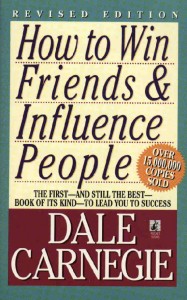Modernization of Dale Carnegie’s ‘How to Win Friends and Influence People’
Fundamental Techniques in Handling People
1. Criticize, condemn, complain.
2. Don’t give any appreciation. (You are ‘Just being honest.’)
3. Arouse in the other person the desire to retweet you and ‘like’ your personal page on the Facebook.
Six Ways to Make People Like You
2. Smirk.
3. Ask ‘What was your name again?’ even if you remember.
4. Be a good speaker. Encourage others to talk about you.
5. Talk in terms of your interest, always.
6. Make the other person feel unimportant –do not stop until they feel so.
Twelve Ways to Win People to Your Way of Thinking
2. Show utter disrespect for the other person’s opinions. Never say “I was wrong.”
3. If you’re wrong, deny it consistently and fervently.
4. Begin in a daunting way.
5. Your questions are always rhetorical and not to be answered.
6. Completely monopolize the ‘conversation.’ You are a go-getter. You know what you want.
7. Let the other person–as well as everyone else–know every idea is yours.
8. Disregard the other person’s point of view.
9. Be dismissive of the other person’s ‘ideas’ and desires.
10. (Define ‘nobler.’)
11. Make a PowerPoint with moving images and as many Clip Fart images that may be used.
12. Make everything a challenge. You are a perfectionist.
Be a Leader: How to Change People Without Giving Offense or Arousing Resentment
1-8. Lol, yeah, okay. Miss you Steve.
9. Make the other person happy about doing what you suggested, but let them know it could have been better.
Mean Mondays: Semantic Help

A lot of terms get thrown around in this literary world, and people get confused. The following guide shall clarify once and for all the meaning of these terms.
“Sell out” vs. “Sold out”
‘Sold out’ means that the inventory of a book has been depleted, which is generally considered a good thing. It means that ‘the public’ likes you, and that your voice is ‘evocative’ and perhaps even ‘consequentially irrevocable.’ If you make 3 chapbooks and they ‘sold out’ to your mom, roommate, and best friend, your voice is not consequentially irrevocable, but a faint whine in the distance. ‘Sell out’ is a word less successful people use to denote someone who has experienced more success. This term implicates that the ‘sell out’ is a morally deficient person who, instead of the noble march towards truth (i.e. incomprehensible manuscripts), has opted to reap the rewards of a populist/philistine mentality (i.e. comprehensible manuscripts).
“Friends” vs. “Real Friends”
‘Friends’ is what you call somebody you don’t know who has contacted you by email, instant message, or via blog comments. The hyper-mediated ‘online’ experience of these friendships often feel better than real friendships, because in the latter, one has to deal with body odor, dandruff, and other aggravating physiological vicinities. It’s like porn vs. actual sex. Online friends are photoshopped, a blank canvas of fantasy.
“Upload” vs. “Load”
‘Upload’ is to save a file (jpeg, gif, doc, mpeg, etc) onto a server so that others can retrieve it either by ‘downloading’ it, or simply viewing it as an embedded file in a browser. “Load” functions as a prefix or suffix, as in ‘load of shit’ or ‘you are such a fat load’ (respectively). Keep in mind, overlaps do happen: A ‘fat load of shit’ often ‘uploads’ word docs into submission engines while emo music plays in the background. There is no hope for you.
“Editor” vs. “Dickwad”
I am an avid (rabid?) submitter. Once I write a story (often before proof-reading) I ‘blast’ it out to six or so journals. This is the result of a rare mixture of shamelessness, boredom, and narcissism. Now and then, 3 months later, an ‘editor’ writes back and says things like “the story doesn’t go anywhere, you are a mere stylist,” or worse, “thank you for your submission, but due to the large amount of submissions we get, we only had time to write this cruel and condescending letter.” A ‘dickwad’ is a ‘wad’ of something (usually semen-saturated toilet paper) which is dry-crusted to said ‘dick’ in a non-aesthetically compelling fashion. It is often difficult to distinguish an ‘editor’ and a ‘dickwad.’
“Bio” vs. “Autobiography”
A ‘bio’ should be about 2 or 3 lines. It should include five or less publications, the geographic location of the writer, and a link to a website. It is okay, however uninteresting, to include the names of children, pets, and spouses. An ‘autobiography’ is about 400 pages, detailing every small minutia of your desperate-for-fame life. When you include your ‘bio’ with a submission or publication, be sure to include your ‘bio’ and not your ‘autobiography.’
“Nepotism” vs. “Networking”
‘Nepotism’ is when your father or uncle (it’s a patriarchal term, hence the gender bias) uses his leverage within an institution to either secure a position or procure a benefit/material to you within said institution. For example, that Trump Jr. is the Vice President of Trump Corporation is an example of nepotism. Paris Hilton, while her funds are derived from the Hilton Enterprise, is not a nepotist as much as a cunt. ‘Networking’ is contemporary nepotism without the genealogy. For example, that I am a contributing writer for this pale green blog is an example of ‘networking.’

